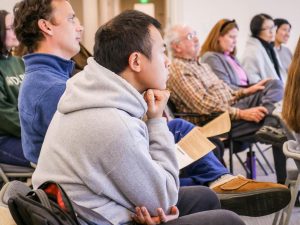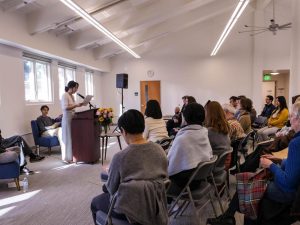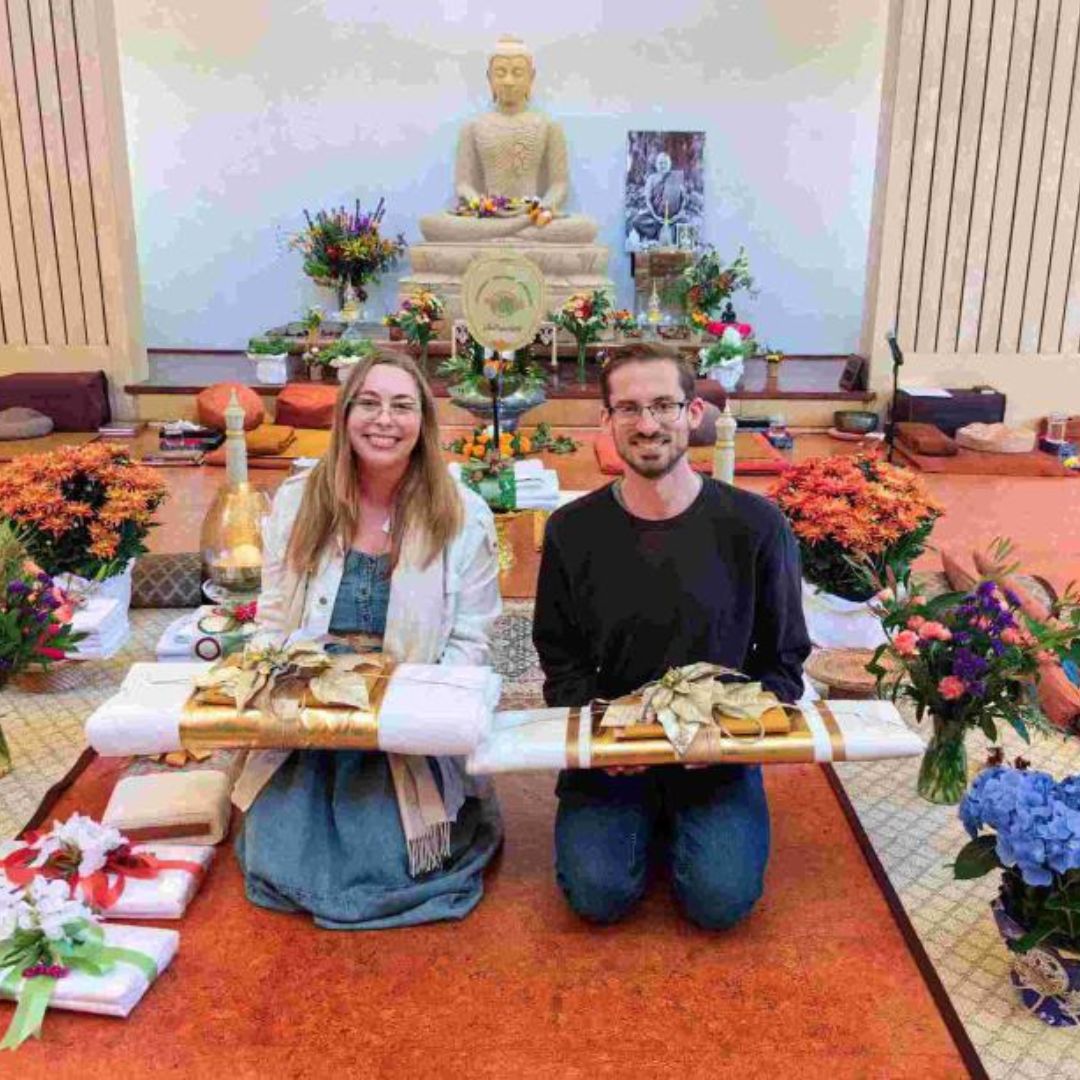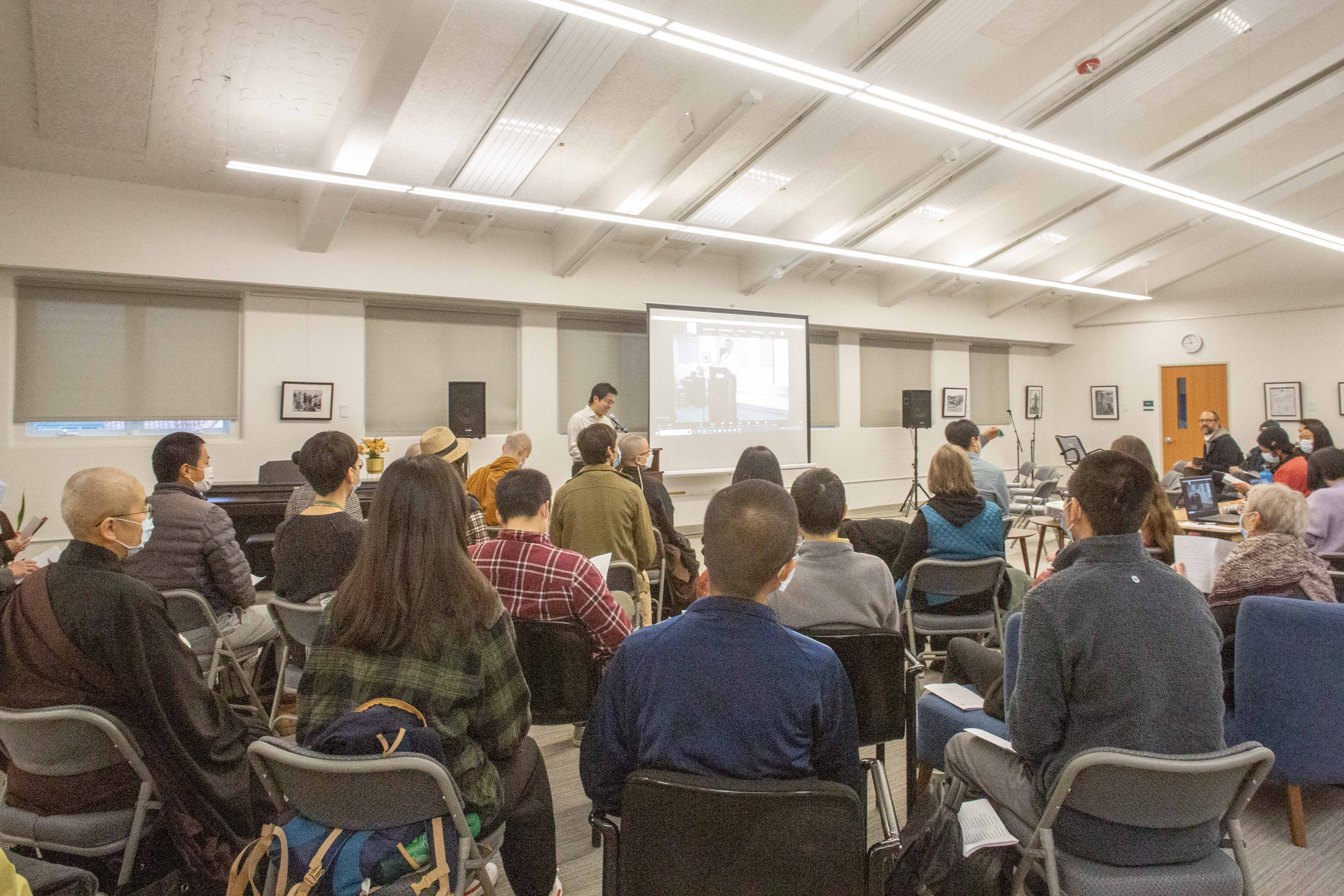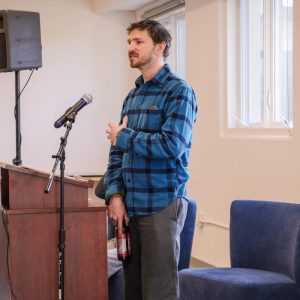
The First Annual DRBU Student Symposium took place on Sunday, February 25, 2018 in the new DRBU Southwing. Ten students from across cohorts in the BA and the MA programs came together and shared papers that dove deep into primary texts and wove together experiences from daily life and cultivation. Their inspiring thoughts bore testament to the spectacular discoveries that emerge in shared inquiry and to the spirited personal journeys of DRBU students, who venture to apply what they learn.
Paper and abstracts
Lan Huang
Kṣānti Pāramitā – The Perfection of Patience
In this paper, the author explores the essence of the practice of kṣānti pāramitā – the Perfection of Patience, one of the Six Perfections practiced by Bodhisattvas in the Mahayana tradition. The author asks: What does it mean to practice the pāramitā of patience? What does it feel like? Are Buddhists practicing patience expected to just be passive observers of the world? Why does a Bodhisattva need to practice patience? To answer these questions, the author read Master Hsuyun (Empty Cloud) and Master Hanshan’s (Silly Mountain) autobiographies, identified all the descriptions where they practiced or instructed others about patience, looked closely for patterns and recurring themes to illuminate some important aspects of this practice, and summarized her findings in this paper.
Lisa Liang
Beyond the Rigidity of Words: Chan as a Re-orientation of the Mind Toward Language
Chan Buddhism is often described as a teaching beyond words. Yet it skillfully employs figurative and poetic expressions which point directly at the essential nature. Ironically, the skillful use of language allowed Chan masters and practitioners to transcend language. Indeed, highly influential in the Chan tradition is Huineng’s Platform Sūtra. Setting the tone for the entirety of the lineages descending from him, Huineng purports that Chan practice is free from linguistic expressions. In fact, the Platform Sūtra encourages an openness of mind that suspends (epoche) attachment to subjective biases to facilitate awakening. This paper primarily focuses on the Platform Sūtra and secondarily Zen Flesh, Zen Bones to address the relationship between Chan and words. Huineng cautions against not the provisional use of words but clinging one-sidedly to them. One must transcend rigidity of words in order to break through attachment and arrive at the unclouded, free-flowing, non-abiding mind.
Alex Wang
The 84,000 Dharmas are only One
Since I first began learning about Buddhism, I have had lingering doubts about how Buddhist practices (e.g sitting in Chan or reciting the Buddhas name) will eventually lead to liberation. This semester in Buddhist Classics we have investigated the true nature of practice. My conclusion is that the entirety of Dharma is simply the teaching of living beings to ‘not follow’ their discursive thinking, to remain unattached to sensory experience while amidst sensory experience and to awaken to the original purity of the mind. In this way, all of the myriad Dharma Doors are simply an expedient way for living beings to train the mind to not follow discursive thinking and to awaken to the nature of all phenomena. In this essay I will explain on an intellectual level how this process transpires in the practice of Buddha Recitation and briefly describe how Chan meditation will follow through the same process.
Vien Trung Tinh
How Do The Five Skandhas Affect Our Whole Lives?
I chose the five skandhas as a topic for this paper to demonstrate how the body and mind are interrelated or interconnected, and the effects they may have on the path to achieve liberation. This paper also illustrates how the skandhas affect our daily lives, and how it can be used daily in everything we do. In this paper, I investigate the five skandhas through the lens of various Sutra text.
Ashley Wood
Brahmanism and Buddhism: Religion, Dharma, and Cultivation
The paper is a 5 page comparison and contrast of Brahmanism and Buddhism with a focus on religion, dharma, and cultivation and is based on my readings of Bhikkhu Bodhi’s In the Buddha’s Words and Ashva-Ghosha’s Life of the Buddha. The essay asserts, and attempts to provide evidence for the assertion, that the Buddha’s teaching represents a shift in collective consciousness whereby the path to freedom of mind and deeper understanding of the nature of reality is made available to everyone, knowledge which had previously been distorted and/or incomplete as well as reserved for the elite under the Brahmana religion. My approach is to define religion and Brahmanism, analyze passages that reveal the Brahmana tradition, look at the Buddha’s reforms, reveal why the Buddha was not satisfied with the Brahmana path, and provide a brief explanation of the Buddha’s core teaching.
Kathleen Irby
What is the Direct Teaching Method?
This paper compares and contrasts the direct teaching methods of Jesus and the Sixth Patriarch. The paper begins by defining “direct” and then describes how Jesus and the Sixth Patriarch taught their disciples. The thesis is also the conclusion that direct teaching is the attainment of a higher state that is achieved on our own. Jesus and the Sixth Patriarch taught that we are responsible for our own cultivation and we can directly attain sagehood or Buddhahood by becoming aware through purifying our bodies, hearts and minds. Emphasizing the importance of self cultivation, the paper represents two strands and demonstrates the similarities of philosophies we are learning in the Great Books program.
Indrayani Ananda Barker
Beyond Knowledge: The Practice of Contemplative Epistemology
The Lankavatara Sutra and D.T. Suzuki provide contemplative epistemological frameworks, experiential methods for accessing the true nature of oneself and reality. They suggest that, to truly access reality, a person not only has to conceptually understand the mechanisms of existence, she also needs to experientially understand the nature of existence through introspective contemplation. To truly know is to know beyond language. And, to awaken is to even go beyond notions of knowing. I argue that although the search for perfect knowledge and epistemic confidence often begins with analytic inquiry, one will ultimately need to turn to a deeply contemplative, or experiential, method of inquiry that goes beyond the words that merely point to an eventual experiential epistemic awakening. I motivate my argument with accounts of the contemplative epistemological frameworks from The Lankavatara Sutra and from Essays in Zen Buddhism. I also present differences between The Lankavatara Sutra and Suzuki’s philosophy.
Mojo Tchudi
Beyond All the Rules of the Games
In this presentation I will share my paper “beyond all the rules of all the games”, which I wrote in Fall for Comparative Hermeneutics I. In this presentation I will describe how the ways in which language is used have a direct and profound impact not only on interpersonal communication but also on the ideas and spiritual exercises themselves. I will use this concept of “language games” (from Wittgenstein) to examine spiritual exercises from buddhism, using two prime examples: repentance and liturgy. I will then show how the Sixth Patriarch Master Huineng plays an entirely different type of language game by putting the spiritual exercises into a dramatic new context. I will conclude my presentation with a brief discussion of the “perfection of wisdom”, which seeks to get beyond language games altogether and into a direct unmediated awareness of reality.
Justin Howe
The Realization of the Land of Ultimate Bliss
Especially to eyes conditioned by Christianity, Pure Land recitation can seem an opaque devotional practice redolent of “religion.” “This isn’t the psychological Buddhism I was promised!” But even through a distinctly Western lens, a more compelling picture might appear, challenging dismissive preconceptions. This paper applies the analysis of traditional narrative pragmatics detailed in Section 6 of Lyotard’s Postmodern Condition to “The Buddha Speaks of Amitabha Sutra.” Seen in their conformity to — and departure from — Lyotard’s proposed narrative characteristics, the Sutra and its recitation practice are revealed as radical and highly-sophisticated mechanisms for transformation. In this direction also lies, perhaps, the possibility for an alienated West to resuscitate its own traditions.
Brianna Morseth
Translating Theory into Praxis: Husserl’s Phenomenology as a Hermeneutical Approach to the Lankavatara Sutra
Both The Crisis of European Sciences and Transcendental Phenomenology and the Lankavatara Sutra appear abstract and distant from personal experience. Yet phenomenology and cultivation engage with the lived experience, examining the philosopher and cultivator as subject. This paper thus investigates the bodhisattva’s practice in the Lankavatara Sutra via the hermeneutical framework of Husserl’s phenomenology to address how one embodies the practice of “mind-only” philosophy. This process begins through the phenomenological examination of one’s conscious experience, revealing that all perceptions of phenomena are projections of the mind. Wisdom unearthed through this inquiry into the structures of consciousness manifests not as solipsism but as compassion in the form of intersubjectivity, by which one transcends the limited, finite self and understands the inherently relational nature of being. In this way, “mind-only” philosophy translates into the lived experience of the bodhisattva, who embodies the phenomenological method not only in theory but in practice.
